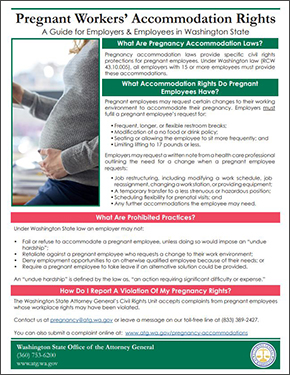Pregnancy and Breastfeeding Accommodations
Washington law provides specific civil rights protections for pregnant employees. These protections apply to an employee’s pregnancy and pregnancy-related health conditions, which include health conditions during pregnancy and after the birth of the baby, such as the need to breastfeed or express milk. If a pregnant employee works for an employer with 15 employees or more, the employer is required to provide the following reasonable accommodations to the employee:
- Providing frequent, longer, or flexible restroom breaks;
- Modifying a no food or drink policy;
- Providing seating or allowing the employee to sit more frequently; and
- Refraining from lifting more than 17 pounds.
In addition, a pregnant employee may have rights to other workplace accommodation(s), as long as there is no significant difficulty or expense to the employer. These are:
- Job restructuring, including modifying a work schedule, job reassignment, changing a work station, or providing equipment;
- Providing a temporary transfer to a less strenuous or hazardous position;
- Scheduling flexibility for prenatal visits;
- Providing reasonable break time for an employee to express breast milk for two years after the child's birth each time the employee has need to express the milk and providing a private location, other than a bathroom, if such a location exists at the place of business or worksite, which may be used by the employee to express breast milk. If the business location does not have a space for the employee to express milk, the employer shall work with the employee to identify a convenient location and work schedule to accommodate their needs; and
- Providing any further accommodations the employee may need.
Employers may not ask for written certification from a healthcare professional for the accommodations in 1–4 or 8 above. Employers may request written certification from a health care professional regarding the need for the accommodations in 5–7 and 9 above, or for restrictions on lifting 17 pounds or less.
Employers are prohibited from retaliating against pregnant employees who request one of these changes, denying employment opportunities to pregnant employees who are otherwise qualified, or requiring pregnant employees to take leave if an alternative is available. Additionally, pregnant employees with a pregnancy-related disability may have rights in addition to those listed here.
The Civil Rights Division accepts complaints that an employer has failed to accommodate an employee’s pregnancy. You may contact us at pregnancy@atg.wa.gov or by leaving a message on our toll-free line at (833) 660-4877. You may also submit a complaint using our online form and a staff member will follow up with you.
PREGNANCY ACCOMMODATIONS GUIDE FOR EMPLOYEES AND EMPLOYERS
This one-page flyer provides information about the specific accommodations required for pregnant workers under Washington state law. The flyer is designed to inform both employees and employers of their rights and responsibilities under the law, and is available in both English and Spanish.
The flyer outlines what pregnancy accommodation laws are, the rights that pregnant employees have in the workplace, which practices are prohibited for employers, and how pregnant employees can report pregnancy accommodation violations.

 Other Languages
Other Languages